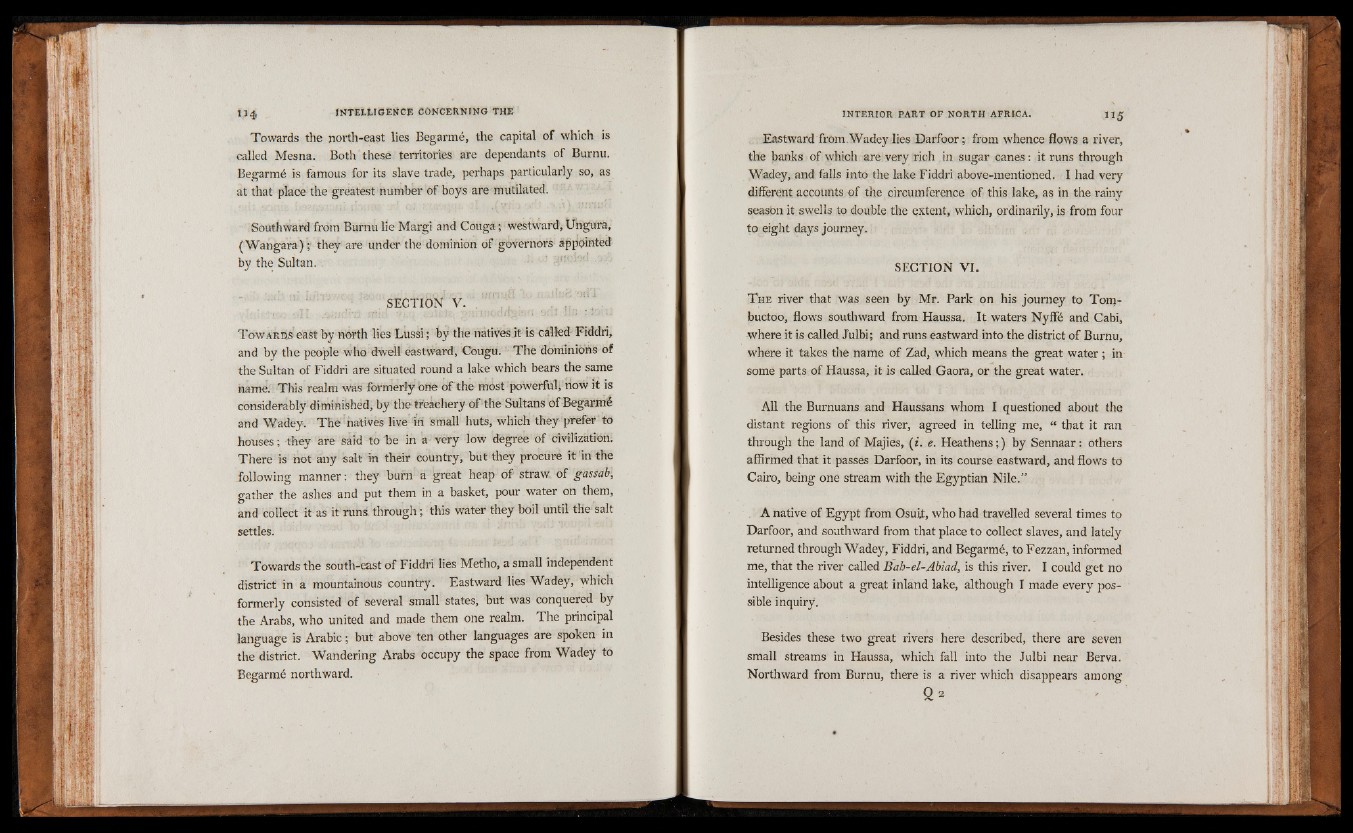
Towards the north-east lies Begarmé, the capital of which is
called Mesna. Both these territories are dependants of Burnu.
Begarmé is famous for its slave trade, perhaps particularly so, as
at that place the greatest number of boys are mutilated.
Southward from Burnu lie Margi and Couga ; westward, Üngura,
(Wangara); they are under the dominion of governors appointed
by the Sultan.
5 s e c t io n * v . _ y y , '*.
Tow a r e s east by north liés Lussi ; by the natives.it is called- Fiddri,
and by the people who dwell eastward, Cougu. The dominions of
the Sultan of Fiddri are situated round a lake which bears the same
name. This realm was formerly bile of the most powerfufetiow it is
considerably diminished, by the treachery of the Sultans of Begarmé
and Wadey-. The natives live in small huts, which they prefer to
houses; they are said to lie in a very low degree of civilization.
There is hot any salt in their country, but they procure it in the
following manner: they burn a great heap of straw, of gassab,
gather the ashes’ and put them in a basket, pour water on them,
and collect it as it runs, through'; this water they boil until the salt
settles.
Towards the south-east of Fiddri lies Metho, a small independent
district in a mountainous country. Eastward lies Wadey, which
formerly consisted of several small states, but was conquered by
the Arabs, who united and made them one realm. The principal
language is Arabic ; but above ten other languages are spoken in
the district. Wandering Arabs occupy the space from Wadey to
Begarmé northward.
Eastward from.Wadey lies Darfoor; from whence flows a river,
the banks of which are very rich in sugar canes: it runs through
Wadey, and falls into the lake Fiddri above-mentioned. I had very
different accounts of the circumference of this lake, as in the rainy
season it swells to double the extent, which, ordinarily, is from four
to eight days journey.
SECTION VI.
T he river that was seen by Mr. Park on his journey to Tom-
buctoo, flows southward from Haussa. It waters Nyffe and Cabi,
where it is called Julbi; and runs eastward into the district of Burnu,
where it takes the name of Zad, which means the great water; in
some parts of Haussa, it is called Gaora, or the great water.
All the Burnuans and Haussans whom I questioned about the
distant regions of this river, agreed in telling me, “ that it ran
through the land of Majies, (i. e. Heathens;) by Sennaar: others
affirmed that it passes Darfoor, in its course eastward, and flows to
Cairo, being one stream with the Egyptian Nile.”
A native of Egypt from Osuit, who had travelled several times to
Darfoor, and southward from that place to collect slaves, and lately
returned through Wadey, Fiddri, and Begarmi, to Fezzan, informed
me, that the river called Bah-el-Abiad, is this river. I could get no
intelligence about a great inland lake, although I made every possible
inquiry.
Besides these two great rivers here described, there are seven
small streams in Haussa, which fall into the Julbi near Berva.
Northward from Burnu, there is a river which disappears among
Q 2